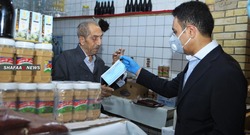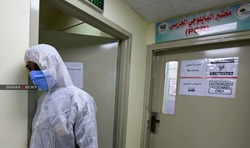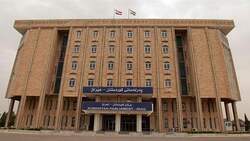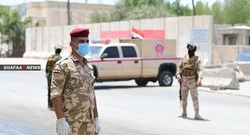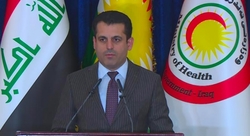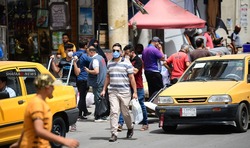When COVID-19 failed to unite hearts and silence the sound of guns

Shafaq News/ The harsh lesson of COVİD-19 was not enough for humanity to learn to give precedence to its collective interests over other differences and conflicts; as more than eight months have passed since the emergence of the global pandemic, but a call for a "global truce" issued by the United Nations (UN) since March 2020 has not resonated with anyone.
Five months ago, UN Secretary-General Antonio Guterres called for a worldwide ceasefire to deal with COVİD-19 pandemic, and the UN Security Council adopted the call by a formal resolution on July 1st; so far, not even a single conflict has been resolved or calmed down.
The irony is that, while COVİD-19 has acted with us without any religious, social, political, or class discrimination; and has equated all people with its danger; since its emergence, the world’s countries have been acting with a lot of selfishness, isolationism, and fragmentation; and refused -despite the great wave of death- to unite, as happened when the administration of President Donald Trump tried to monopolize a potential drug that was developed by a German company.
Indeed, there is a lot of evidence that multiple conflicts have flared up because of Coronavirus (COVİD-19), as happened between the United States and China, or worsened in conjunction with its appearance, such as in the Libyan armed conflict, or exploded despite the existence of the pandemic, as in the Ethiopian-Egyptian conflict over the waters of the Grand Renaissance Dam.
This general societal behavior points to selfishness in dealing with the threat of the pandemic; reinforced by the populist and nationalist tendencies that have grown in the light of COVİD-19 in many societies, where leaders and officials are competing in speeches of intimidation and tension to promote their internal popularity, exploiting the anxiety, unrest, and economic malaise that the virus has brought to societies.
Many international facts demonstrate this. One of the most notable examples is President Trump's behavior with China -where the virus is believed to have made its debut, as he dealt with it in a tone of populism and condescension when he accused it of inventing the virus and spreading it around the world, in an attack that also included the World Health Organization (WHO), which he considered to have been complicit with Beijing.
Things went further, while the Chinese struggled - and still are - to get over the pandemic, the Trump administration imposed more economic sanctions on them and then announced a freeze on funding WHO, which is globally tasked with coordinating combating COVİD-19 efforts.
Less serious events have occurred but reflect the selfish and isolationist behavior to which we have referred. Countries withheld exports of medical equipment that passed through their territory to other countries; for example, while Spain -which was hit hard by the virus in the first weeks of the pandemic, struggled to get out of its ordeal, Turkey blocked a shipment of medical equipment containing hundreds of respirators imported by Madrid, before releasing it.
Italy, at the start of the violent pandemic, has appealed to European countries for medical equipment and supplies; but Germany and France have quickly imposed a ban on the export of corona-linked medical products to any country. In contrast, aid from China (the EU's supposed economic and political opponent) has poured into the Italians, cleverly exploiting the crisis.
The Libyan armed conflict has not been deterred by the dangers of COVİD-19. Although field marshal Khalifa Haftar's military offensive on the capital Tripoli was a year old, his military operation gained momentum as the first case of COVİD-19 emerged in Libya on March 25th, 2020.
The spread of the Corona among Libyans -which has infected more than 4,000 people- has not deterred soldiers and militants from fighting on multiple fronts in the conflict between Benghazi and Tripoli and the regional forces supporting each other; while the influx of mercenary militants from northern Syria to Libya continued to fight alongside the government of Fayez Al-Sarraj.
Although the fighting fronts have been reduced in recent days after the break-up of the Haftar attack on Tripoli, the conflict is still in flames and can explode at any moment; while Libya’s National Center for Disease Control announces 190 cases two days ago, the highest daily toll since the virus emerged.
Besides, speculation is growing that Egypt may intervene directly in the Libyan war in support of Field Marshal Haftar's authority; which Egyptian President Abdel Fattah Al-Sisi publicly declared, after which he received prior parliamentary approval allowing the military to operate outside the country's borders. Egypt is in the midst of a serious conflict with its distant neighbor Ethiopia, which has built the Grand Renaissance Dam on the Nile -despite Egyptian protests, which Cairo considers as an infringement of its water rights.
The tension between Addis Ababa and Cairo portends the possibility of a military confrontation, even if it is far-reaching, especially with the presence of air, naval, and long-range missiles; which means that war between Egypt -which has more than 90,000 infections, and Ethiopia -where more than 15,000 infections have been reported, is not off the table.
This complex relationship between COVİD-19 and political crises takes many forms. In Iraq, for example, the election of Mustafa Al-Kadhimi to head the Iraqi government came as the pandemic's wave began to rise in May, while attempts to bring Iraq to safety from regional tensions, particularly between Tehran and Washington, continued.
Turkey had another opinion. In June, ground incursions and aerial bombardments were launched into Kurdistan’s territory against suspected Positions of the Kurdistan Workers' Party (PKK); without taking into account the international invitation to “Corona Truce”.
Iran, one of the first countries hit by the coronavirus (COVİD-19) and has so far recorded some 300,000 cases -and has not been spared from the pandemic-political crises. Despite its appeals to the countries of the world to help them to prevent any further spread of the virus on its soil; the U.S. administration has been quick to try to abort any possible aid from abroad because it is under sanctions, the U.S. also threatened the countries that may make any attempt to help them.
In Syria, despite the relative calm on Idlib's fronts, the tension of the Syrian file has remained thick; Israel’s airstrikes on various Syrian sites over the past months, and the "export" of mercenaries from the north of Syria to Libya, while 700 COVİD-19 infections were "officially" recorded, and international agencies fear that many more have not been detected.
So, COVİD-19 pandemic failed to unite us or to eliminate the political and military differences; just as we have failed to join forces in confronting it despite recording 17 million infections and more than 600,000 fatalities so far.
